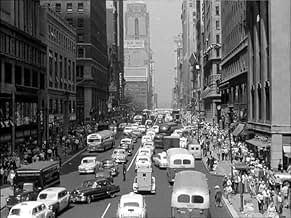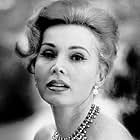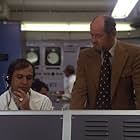This very funny film is unusual in many ways. First of all, it is a French satire of American movies (i.e. gangster films) as they were perceived by the French in 1953, paying back the American film industry for all the clichés it propagated about various nationalities, such as the French and the Italians. This intention is expressed clearly in the prologue. As such, it is infinitely more interesting than the adulating stance the young critics of "Les Cahiers du cinéma" had towards American film-making at the same time. French people at that time loved to make fun of Americans almost as much as they loved seeing their films. This explains Jerry Lewis's special status in France: an American comedian making fun of the American way of life.
Furthermore, it is a French-Italian production, whose indoor scenes were shot at Cinecitta and exteriors were done in the US, for more authenticity. It stars a hodge-podge of talent: Fernandel, a big comedy star both in France and Italy (because of his Don Camillo films), Zsa Zsa Gabor (an international star who could speak French), David Opatoshu, an American Yiddish actor, equally at ease in gangster roles and Biblical films, who could also speak French with the required American accent, Louis Seigner, a member of the Comédie-Française, who could literally do anything, and Paolo Stoppa, an prominent Italian character actor.
In this film, everyman Fernandel is mistaken for the leader of a crime syndicate, a situation that accommodates everybody: the police, the politicians, the gangsters themselves, the media and even Fernandel's female co-worker at the department store where he used to be an incompetent and myopic product demonstrator.
The film is extremely funny in its depiction of American media, police procedure and (perceived) obsession with crime and criminals. Its judgement of America wasn't very off the mark when one considers what American films have become in the last part of the last century (ever since "Bonnie and Clyde" and "The Godfather") and what they are now: completely preoccupied with crime, blood, violence, mayhem, murder, torture, death and destruction.
Fernandel is excellent throughout (as always) but a special prize should go to David Opatoshu who created the part of Slim the Killer, a slightly dim-witted assassin who uses the immortal line: "J'suis une p'tite tête" (I'm not a thinker), which all Frenchmen will always fondly remember.
It is directed by Henri Verneuil, an Americano-Armenian Frenchman who directed some of the most memorable gangster films ever made but was not above satirizing his American models, as this comedy shows. The dialogues are by the immortal Michel Audiard. As an extra bonus, the music is in part written by Nino Rota (Fellini's composer) using a very before-its-time early synthesizer instrument called Ondes Martenot to lend the whole film an aura of wonder and mystery.
The DVD of this film is only available in Region 1 in its French unsubtitled version from Quebec distributor Imavision. It deserves to be offered in a Criterion edition with enough annotations and extras to explain its many subtleties to the Americans it so efficiently derides.
































